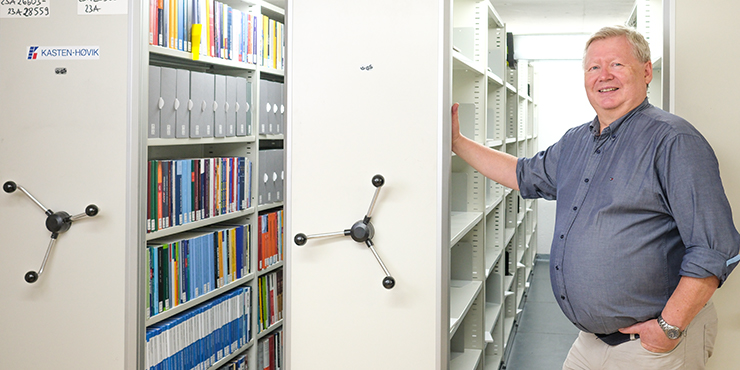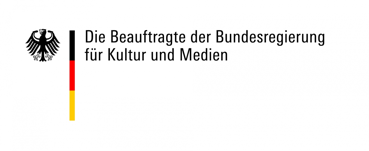University partnerships for vocational and advanced training

The training market is in a state of flux, and customised offers have been scarce until now. DNB has expanded its cooperation with universities in 2022. (Photo: Stephan Jockel)
The German National Library (DNB) is Germany's central archival library and national bibliographic centre – and performs a large number of systemically important statutory tasks. More and more of these have been digitised over the last few years. The same applies to the DNB's developmental strategy and priorities. These can only be realised with the right partnerships and structures – and qualified, dedicated staff are needed most of all. The DNB is also cooperating with universities so that staff can be recruited early on and would-be librarians can undergo hands-on training.
With regard to digital transformation, the DNB is involved in a large number of associations, committees, working groups and other structure-building initiatives. These include CLARIAH-DE, DINI, dbv, DDB, DHd, DIN/NID and nestor. The DNB is also committed to the further development of data standards, also as part of the ongoing opening of the Integrated Authority File GND (GND4C) and the establishment of the National Research Data Infrastructure (in the NFDI consortia Text+, 4Culture, 4Memory, 4Objects).
It also issues digital humanities calls and grants DH fellowships to facilitate external research into its data holdings besides realising its own externally funded research projects, e.g. into the use of AI in content cataloguing. Digital humanities are defined as a field of research encompassing the use of digital resources in the humanities.
Digitality in everyday working life
Another of the DNB's fields of work encompasses digital public science services such as "Coding da Vinci". It is also involved in the construction and user-oriented development of the Deutsche Digitale Bibliothek (German Digital Library, DDB). Furthermore, the DNB participates in externally funded collaborative research into digital transformation, and regularly advises policymakers – particularly its supervisory authority, the Federal Government Commissioner for Culture and Media (BKM) – on matters relating to the digital transformation of the public cultural sector.
Last but not least, it is involved in the development and implementation of strategic cultural policy initiatives. These currently include "Datenraum Kultur" ("Culture Data Space"), the "Allianz zur Kulturgutdigitalisierung" ("Alliance for the Digitisation of Cultural Heritage") and the "Kompetenzzentrum für digitale Kultur" ("Competence Centre for Digital Culture").
People bring digitisation to life
There is a need for people to perform these tasks. Many of the DNB's staff not only have to deal with the tasks that have already arisen as part of the process of digital transformation but are also regularly required to familiarise themselves with new ones at the interface of digital and cultural competence, specialist proficiency and the expertise of memorial institutions.
This change in the professional scope of any national library is made more difficult by the general shortage of qualified staff. It is exacerbated by the fact that digital experts are desperately sought after in almost all areas of life. Moreover, the occupational training market for librarians is itself in a state of flux, and suitable opportunities have hitherto been rare. The result? An intense, ever-growing pressure to actively seek solutions and contribute to their development.
DNB seeking partners for solutions
This is why the DNB is endeavouring to establish and expand direct partnerships with universities as part of its employer branding activities. The goal: to promote vocational and advanced training in order to meet the DNB's current and future needs. Several projects were initiated or launched in 2022. Three of them are described here:
1. Collaborative teaching partnership with Philipps-Universität Marburg (University of Marburg) on the Master's degree programme in Cultural Data Studies
This course of study is offered by the MCDCI – Marburg Center for Digital Culture and Infrastructure – where the University of Marburg strategically concentrates its digital humanities activities. The collaborative teaching partnership was launched in June 2022 with a one-day familiarisation workshop for the first cohort from the new degree programme and the DNB staff responsible for the course. The regular seminar "Cultural Heritage and Digital Transformation" was then offered to second-year Master's students for the first time during the winter semester of 2022/2023. Approx. 20 students obtained insights into the increasingly digitised world of work and diversity of tasks at the DNB against the backdrop of the changes to which the librarian's profession is currently subject.
Digital transformation in the cultural sector
Seminar participants discussed the opportunities and challenges of digital transformation in the cultural sector in general and for cultural heritage in particular. They occupied themselves with strategy papers, reports, data capture and scientific studies. Strategic political projects such as the construction of a competence centre for digital culture currently envisaged in the German government's coalition agreement were discussed in depth. The discussion took place in direct cooperation with the competent department of the Federal Government Commissioner for Culture and Media (BKM).
Along with virtual seminar sessions, two six-hour workshops were held at the DNB in Frankfurt am Main, this time involving the domains/departments Digital Services, German Exile Archive (DEA), DNBLab and Text+. A guided tour of the building was also offered. In future, the seminar will be offered every year during the winter semester and focus on the DNB's current concerns with regard to digital transformation.
2. Collaborative teaching partnership with the Institute for Library and Information Science (IBI) at the Humboldt University of Berlin
This collaborative teaching partnership at Master's level encompasses the same range of topics as the partnership with the University of Marburg. An initial test run took place in the winter semester of 2022/23. Beginning in the summer semester of 2024, the Information Science course will include a module consisting of seminars and lectures – delivered alternately with the Marburg teaching partnership. The IBI is the only university-level library science institution in Germany. The university is therefore of particular strategic importance for the DNB.
Students learning on site at the DNB
The collaborative teaching partnership in Berlin is situated at a similar geographical distance from the DNB's Leipzig location as the Marburg partnership is from Frankfurt. This means that parts of both collaborative teaching programmes can be delivered on the DNB's premises. As is already the case in Marburg, relevant areas and stakeholders at the DNB with their current strategic goals and areas of concern are also to be actively integrated into the teaching partnership based in Berlin.
3. DNB involvement in the joint project HERMES
The objective of the DNB's participation in the joint project HERMES is not only the regional expansion of its partnerships with universities but also the expansion of the digital humanities partner network. It focuses on the advanced training of highly qualified personnel in the GLAM sector and in the humanities and cultural sciences. The background is a call for proposals issued by the Federal Ministry of Education and Research (BMBF) in June 2022. The BMBF is offering funding for the construction of data competence centres in the scientific field by means of a two-part call procedure. The DNB is collaborating on the HERMES proposal with eight scientific institutions in Hesse and Rhineland-Palatinate, while the proposal itself is being coordinated by the above-mentioned MCDCI – Marburg Center for Digital Culture and Infrastructure.
Pooled expertise thanks to HERMES
HERMES functions as a supraregional network: it is constructing a decentralised data competence centre at the interface of innovative digital methods and sustainable data curation practice. HERMES focuses on the digital humanities and cultural sciences. It pools the expertise of the supporting institutions at (real and virtual) teaching, research and networking locations. The network is also creating a framework for the innovative application and further development of data science methods in the humanities and cultural studies. Last but not least, HERMES is contributing to the establishment of a critical data culture in the disciplines involved.
Prospect of around EUR 3.5 million in funding
The DNB is the link with the GLAM sector, in which more and more positions are currently being created for people with "mixed" competences. For the first funding phase – which began on 1 December 2022 – 22 applicants were selected from 74 proposals. Each of these will now receive five months of material and personnel funding for the purpose of developing a main proposal.
Fellowships, workshop & doctoral student network planned
In the event of the funding being granted, the DNB's work in HERMES would largely focus on the expansion and further development of the digital humanities fellowships (in cooperation with another HERMES partner, the Leibniz Institute of European History (IEG)). There are also plans to establish and supervise a workshop series under the name "Transferwerkstatt" ("Transfer Workshop"), in cooperation with another HERMES partner, the Herder Institute for Historical Research on East Central Europe (HI – also a member of the Leibniz Association)).
This will focus on topics such as the further development of study curricula, job profiles and collective pay agreements with an eye to the current, digitally driven changes in the GLAM field. Moreover, the DNB would gain direct access to a doctoral network developed as part of HERMES.
Click here for further information about the ongoing opening of the Integrated Authority File GND (GND4C) and the structure of the National Research Data Infrastructure (in the NFDI consortia Text+, 4Culture, 4 Memory, 4Objects).
Read more about the DNB's digital humanities calls and the fellowships with which it funds external research into its data stock.
Click here to find out more about the digital public science service "Coding da Vinci" and how the DNB is structuring the user-oriented further development of the Deutschen Digitalen Bibliothek (German Digital Library, DDB).
Here you will find further information about the associations, committees and working groups in which the DNB is involved as part of the process of digital transformation:
Last changes:
19.09.2023





